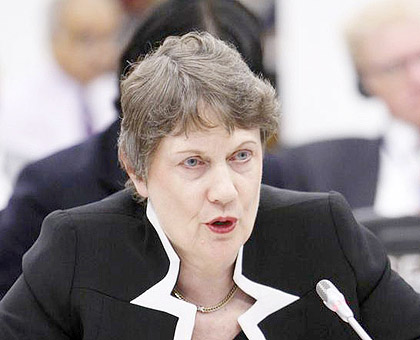East Africa and the rest of the continent must stop using food aid as a safety net and eliminate the hunger that is affecting a quarter of their people if they are to sustain their present economic growth, says a newly released report on food security in Africa.


East Africa and the rest of the continent must stop using food aid as a safety net and eliminate the hunger that is affecting a quarter of their people if they are to sustain their present economic growth, says a newly released report on food security in Africa.The Africa Human Development Report 2012: Towards a Food Secure Future is collaboration between the United Nations Development Programme, the Economic Commission for Africa and the African Development Bank. Its stark message must is that Africa must develop new approaches to empower local communities to ensure food security. Speaking to The New Times last evening the UN Resident Coordinator for Rwanda, Opia Kumah, said the report, which is a first for Africa, indicates that Rwanda has performed very well, being the first on the continent and second in the world in the development index in the last 10 years.The report, a first for Africa, has not ranked countries in order of performance, preferring a general position on development in the continent, said Kumah. "Overal, Rwanda has something to be proud about.”With more than one in four of its 856 million people undernourished, Sub-Saharan Africa remains the world’s most food-insecure region. But the most portent point that the report makes is that Africa has no business rattling the begging bowl for food aid; it is an insult to the continent’s dignity and undermines its ability to feed itself. Africa has ample land, water and favourable climate to feed itself."Impressive GDP growth rates in Africa have not translated into the elimination of hunger and malnutrition,” said UNDP’s Helen Clark, at the launch of the report in Nairobi on Monday. "Inclusive growth and people-centred approaches to food security are needed.” It is an argument that resonates well with President Paul Kagame position that Africa can feed itself if gets its agricultural strategies right.This came out clearly, early this year when he addressed representatives from the Fund for Agriculture Development (IFAD) in Rome where he outlined Rwanda’s experience in modernising its agriculture, which has led to its achieving food security in recent years.At the centre of Rwanda’s dramatic turnaround in food security is the support the government has given to smallholder farmers, which has led to increased food production. The reports says more than 15 million people at risk of malnutrition in the Horn of Africa remain vulnerable after last year’s food crisis in Djibouti, Ethiopia, Kenya, and Somalia and an equal number in the Sahel region alone - stretching from the Atlantic Ocean to the Red Sea.It states that action on agriculture alone will not be enough to eliminate hunger, and new approaches will have to include the improvement of health services and agricultural infrastructure, as well as giving a greater voice to the poor through strengthened local governments and civil society groups. "Building a food-secure future for all Africans will only be achieved if efforts span the entire development agenda,” Miss Clark said at the report’s launch, which was attended by Kenya’s President Mwai Kibaki, who represented the East African Community governments. The report is the first in UNDP’s Human Development Report series which focuses specifically on Africa. It underlines that food insecurity should not be prevalent in a continent that has been experiencing high rates of economic growth and improvements in life expectancy and schooling in recent years. "It is a harsh paradox that in a world of food surpluses, hunger and malnutrition remain pervasive on a continent with ample agricultural endowments,” said the Director of UNDP’s Africa Bureau, Tegegnework Gettu, in a news release received by The New Times. While acknowledging that there are no quick fixes, the report emphasises that food security can be achieved through immediate action in four critical areas. These are increasing agricultural productivity of smallholder farmers; boosting nutrition by expanding access to health services, education and clean water; implementing social programmes that protect farmers against natural disasters and conflict; and giving women and marginalised groups access to land and technology. "The impressive economic growth which much of the continent has been recording must now be accompanied by decisive action to improve food security and nutrition,” Miss Clark said. "Growth divorced from advances in human development does little for people, and without advances in human development, countries cannot meet their full potential either.”


